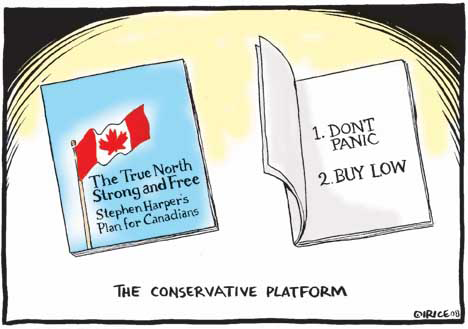
On Sept. 13, speaking at a press conference in Fredericton, New Brunswick, Stephen Harper claimed that "the Canadian public has become more conservative." While the prime minister was arguing that Canadians generally support his party's fiscal policies and prudent handling of the economy, this particular comment sparked a debate on whether Canada is indeed becoming a more conservative nation in the broader sense of the word.
Harper may be right in that most Canadians agree with the Conservatives' premises of fiscal responsibility and lower taxes. In a recent Angus Reid Strategies poll, 33 per cent of respondents said they would rather have Harper handling the economy over the next year than any other federal party leader.
However, Conservative economic policy also calls for increasing free trade and globalization, two policies the Canadian public and their leader may not be in tune with. Almost half of Canadians say that globalization has had a negative impact on the national economy, while three-in-five also feel that globalization has affected environmental protection, job creation and job security for the worse.
Free trade, abortion, drugs and handguns
Canadians also have doubts about free trade. More than half of people across the country want to re-negotiate the terms of the North American Free Trade Agreement (NAFTA), mainly because they believe Canada has gotten the short end of the stick in this deal.
Most people seem to acknowledge the need to seek free trade agreements with other nations but, even so, about three quarters are adamant that Canada should put human rights before commercial gain when negotiating these accords.
So, Canadians generally have been satisfied with the way the Conservative government has handled the economy and think Harper is the best man for the job. In a fiscal sense, the public shows conservative values. What about in the broader sense? Are Canadians increasingly adopting conservative social values as well?
A series of recent surveys shows that half of Canadians think abortion should remain legal under any circumstances , and even more people agreed with the appointment of abortion-advocate Dr. Henry Morgentaler to the Order of Canada earlier this year. Two fifths of Canadians support a harm-reduction approach to drugs instead of punitive measures for addicts; most Canadians would support the legalization of marijuana; seven-in-10 back the idea of punishing non-violent offenders with alternative sentences such as probation or community service rather than jail, and more than half would push for a complete ban on handguns.
Crime and punishment
These findings suggest that Canadians are rather liberal on most social issues. But it would be wrong to make a generalization. Other data shows that many Canadians share some of the social values of the Conservative Party, especially when it comes to handling crime.
The vast majority of people across the country agree with recent modifications to the criminal code by the Harper government introducing punishments for drivers impaired by substances other than alcohol. Moreover, close to 60 per cent of Canadians want to reverse a measure stating that nobody under the age of 12 can be convicted of an offence.
In his September speech quoted above, Harper also stated: "Not only do we want to pull Canadians towards conservatism; also Conservatives have to move towards Canadians if they want to continue to govern the country."
Is there a Harper effect?
Harper seems to believe that since Canadians have embraced conservatism in a fiscal sense, there is room to promote conservative values beyond that point.
Is his ultimate goal to turn Canadians into a socially conservative society in the broader sense?
Does he believe that by showing fiscal discipline and governing successfully -- assuming he will become prime minister again after the Oct. 14 election -- he will eventually lead more Canadians into adopting more conservative views in their day-to-day behaviours?
He appears to believe so.
If the numbers quoted here are any guide, Harper will not face an easy task. Today's Canada may be more fiscally pragmatic, but it cannot truly be described as conservative overall. On a great number of social issues, the public's opinions remain true to liberal values engrained in our society. Whether or not this will change, or how this will change, remains to be seen. While Canadians could certainly become more conservative in the future, labeling this nation as conservative at this point in time remains a daring assumption.
Related Tyee stories:
- Tyee's Strategic Voters' Guide
A riding-by-riding look at pros and cons of voting 'anyone but Harper' in BC. (Not as simple as it seems.) - Canadians, Let's Get Happy
Next PM needs to reinvent how our country measures success. - How Harper Gov't Pushed Financial Deregulation Here, Abroad
Way was cleared for US mortgage firms and easy credit, insured by Canadian taxpayers.
Read more: Politics














Tyee Commenting Guidelines
Comments that violate guidelines risk being deleted, and violations may result in a temporary or permanent user ban. Maintain the spirit of good conversation to stay in the discussion.
*Please note The Tyee is not a forum for spreading misinformation about COVID-19, denying its existence or minimizing its risk to public health.
Do:
Do not: